 Petzlover
Petzlover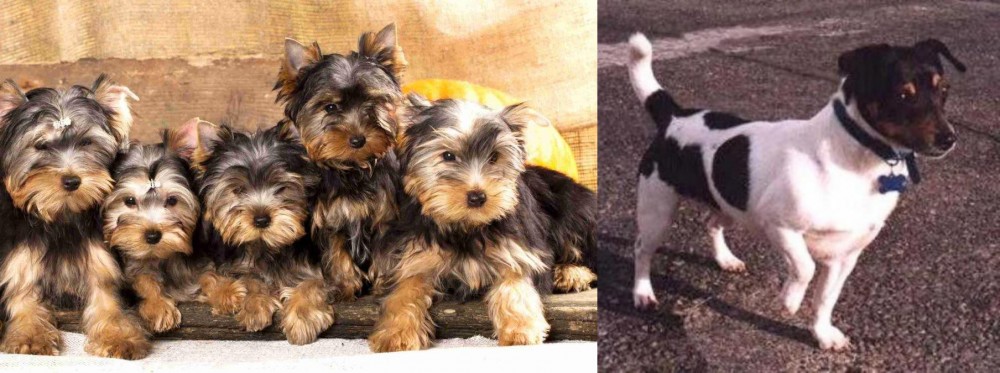 Yorkshire Terrier is originated from United Kingdom but Teddy Roosevelt Terrier is originated from United States. Yorkshire Terrier may grow 13 cm / 5 inches shorter than Teddy Roosevelt Terrier. Yorkshire Terrier may weigh 8 kg / 17 pounds lesser than Teddy Roosevelt Terrier. Both Yorkshire Terrier and Teddy Roosevelt Terrier has almost same life span. Both Yorkshire Terrier and Teddy Roosevelt Terrier has almost same litter size. Yorkshire Terrier requires High Maintenance. But Teddy Roosevelt Terrier requires Moderate Maintenance
Yorkshire Terrier is originated from United Kingdom but Teddy Roosevelt Terrier is originated from United States. Yorkshire Terrier may grow 13 cm / 5 inches shorter than Teddy Roosevelt Terrier. Yorkshire Terrier may weigh 8 kg / 17 pounds lesser than Teddy Roosevelt Terrier. Both Yorkshire Terrier and Teddy Roosevelt Terrier has almost same life span. Both Yorkshire Terrier and Teddy Roosevelt Terrier has almost same litter size. Yorkshire Terrier requires High Maintenance. But Teddy Roosevelt Terrier requires Moderate Maintenance
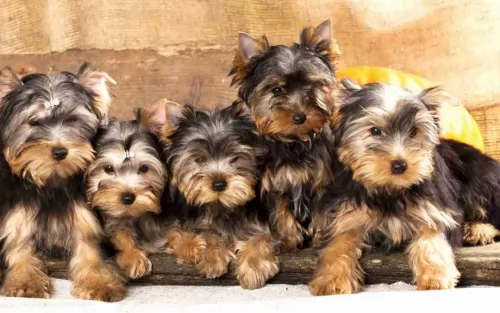 The Yorkshire terrier originated in Yorkshire which is a place in northern England. In mid 19th century workers from Scotland came to Yorkshire in search for work. They brought different varieties of small terriers with them. Earlier they are known as Broken Haired Scotch Terrier and then Toy Terrier. In 1874 they were officially named as Yorkshire Terrier. They begun their journey as hunting dogs and later developed as companion dogs. AKC registered the breed in 1878.
The Yorkshire terrier originated in Yorkshire which is a place in northern England. In mid 19th century workers from Scotland came to Yorkshire in search for work. They brought different varieties of small terriers with them. Earlier they are known as Broken Haired Scotch Terrier and then Toy Terrier. In 1874 they were officially named as Yorkshire Terrier. They begun their journey as hunting dogs and later developed as companion dogs. AKC registered the breed in 1878.
 Teddy Roosevelt Terriers (Teddy, American Teddy) are American hunting terriers related to American Rat Terriers and a host of other working, farm, hunting dogs initially brought by working-class immigrants from England and Europe. Largely due to the working nature of these dogs early the cross breeding was to reinforce useful traits like a superior ability to scent prey. It also bequeathed the breed with superior intelligence. While they take a while to warm up to new people, to their human family they like to be close all the time, and are eager to be with them and please them. Teddy's share their early history with American Rat Terriers, Fox Paulistinha, Tenterfield Terrier and Beagles. They also are related to Feist (dog), and Turnspit dogs, English White Terrier and Wry-legged terrier (all now extinct), as well as Bull, Smooth Fox, Manchester Terriers with Beagles, Italian Greyhound and Whippets in the mix.
Teddy Roosevelt Terriers (Teddy, American Teddy) are American hunting terriers related to American Rat Terriers and a host of other working, farm, hunting dogs initially brought by working-class immigrants from England and Europe. Largely due to the working nature of these dogs early the cross breeding was to reinforce useful traits like a superior ability to scent prey. It also bequeathed the breed with superior intelligence. While they take a while to warm up to new people, to their human family they like to be close all the time, and are eager to be with them and please them. Teddy's share their early history with American Rat Terriers, Fox Paulistinha, Tenterfield Terrier and Beagles. They also are related to Feist (dog), and Turnspit dogs, English White Terrier and Wry-legged terrier (all now extinct), as well as Bull, Smooth Fox, Manchester Terriers with Beagles, Italian Greyhound and Whippets in the mix.
Only since 1996 have Teddy Roosevelt Terriers had standards set for the breed. The major difference between Teddys and the related American Rat Terrier is Teddys are closer to the ground (bench-legged), have greater bone density and more muscle. Teddys are medium to small sized. It was in the mid 1990's that the effort began to breed only the shorter legged phenotype into the Teddy lineage and allow the rat Terrier to be the longer legged variety. The UKC (United Kennel Club) and AKC (American Kennel Club) both recognize Teddys, the UKC since 1999.
The Rat Terrier Club of America separated the long legged and short legged varieties, the short legged ones were named in honor of President Theodore Roosevelt. It is rather interesting that President Theodore Roosevelt, while being very fond of his family dogs did not own any Rat Terriers, and did not help develop the breed that bears his name. He mentions dogs in several of his letters, Skip who rode with the president on his horse while hunting and belonged to a friend, Scamp who lived with the Roosevelt's in the White House and hunted and caught rats and their dog Jack.
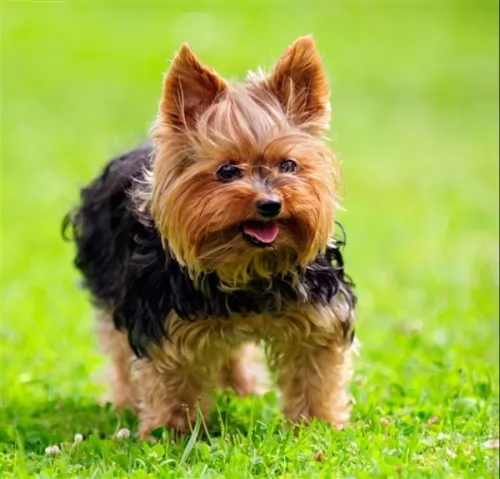 Yorkshire terriers are one of the glamorous member of the dog breeds. They have excellent personality as their owner will be surely proud of them when taking them in public. They like to go outside and make adventures. They are good companion dogs and watch dogs too. They are very affectionate with their owners. Yorkies always bark when any stranger comes and they should be taught about neighbours and when to bark. They will get angry on seeing new dogs and surely chases squirrels.
Yorkshire terriers are one of the glamorous member of the dog breeds. They have excellent personality as their owner will be surely proud of them when taking them in public. They like to go outside and make adventures. They are good companion dogs and watch dogs too. They are very affectionate with their owners. Yorkies always bark when any stranger comes and they should be taught about neighbours and when to bark. They will get angry on seeing new dogs and surely chases squirrels.
They like to spend more time with their people. Leaving them alone for long time is not good. Yorkshire terrier should be treated gently and with love. They love to spend time with older children. They love apartment life if they are made to play and walk daily. Yorkies are the second most popular dog in America.
 Teddy Roosevelt Terriers are hunting terriers that are short legged, well muscled and very active. They have proportionate wide, sightly rounded heads cuneus (wedge) shaped on which the V shaped ears are set on the outside edge. Their ears may be button or erect, and breed standards prefer a docked tail, but it is not necessary. Ideally Teddy's have length/height ratio is 10/7 or 10/8. The Teddy Roosevelt Terriers coats may be solid white, other colors with patches and markings. Their coats are short and rough. Because they are working dogs, what is termed as “honorable” scars from work are not deducted from the dogs points. If the dog is not proportionate to breed standards (for example long legs or square body) it may be disqualified, but exaggerations and faults are marked only is in as much as it interferes with the ability to work. They are very pleasant looking and have a lively manner.
Teddy Roosevelt Terriers are hunting terriers that are short legged, well muscled and very active. They have proportionate wide, sightly rounded heads cuneus (wedge) shaped on which the V shaped ears are set on the outside edge. Their ears may be button or erect, and breed standards prefer a docked tail, but it is not necessary. Ideally Teddy's have length/height ratio is 10/7 or 10/8. The Teddy Roosevelt Terriers coats may be solid white, other colors with patches and markings. Their coats are short and rough. Because they are working dogs, what is termed as “honorable” scars from work are not deducted from the dogs points. If the dog is not proportionate to breed standards (for example long legs or square body) it may be disqualified, but exaggerations and faults are marked only is in as much as it interferes with the ability to work. They are very pleasant looking and have a lively manner.
Teddy Roosevelt Terriers are happy when they are the constant companion of their owner(s) and will shadow their master all day. Temperamentally they love to play, do well in obedience training and are territorial and protective and are exceptional watch dogs. Of course, they were bred as hunting dogs and have hunting instincts, a greater than median prey drive and will chase anything they consider prey such as rabbits, squirrels, birds, stray cats, (and if not trained poultry), as a working dog training is really important. With a heightened sense of smell and superior prey drive, Teddy's have been observed to follow and dig along mole trails (adding further damage to what the moles may have already inflicted), as well as ferret out edible mushrooms.
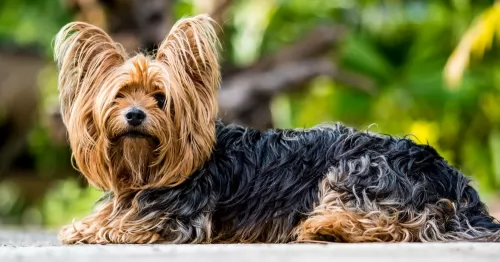 Yorkshire terrier are not so much friendly with children. It is not advised to leave them with children without adult supervision.
Yorkshire terrier are not so much friendly with children. It is not advised to leave them with children without adult supervision.
They were previously used to catch rats and hunt badger and fox. They are excellent watchdogs and defend their territory very well.
They adapts well for apartment living. But they will not be happy if leaved alone for a long time. Yorkies cannot tolerate too hot or cold weather.
They are moderately easy to train. Yorkshire terrier should be trained early when they are amenable to process. Sessions should be conducted with lots of treats and must be short as they will easily get bored.
 1.Children friendliness yes Teddy's love to play and enjoy children. Enjoys spending time with family and interacting with their human family taking part in the everyday routines.
1.Children friendliness yes Teddy's love to play and enjoy children. Enjoys spending time with family and interacting with their human family taking part in the everyday routines.
2.Special talents The breed has high prey drive and an very intense sense of smell One of their talents is to be trained to find, by scent, Black Truffles (a type of edible mushroom) found close to the roots of some trees in the Western half of North America.
 • Ectopia lentis a congenital problem where the lens of the eye is displaced. Eye disease
• Ectopia lentis a congenital problem where the lens of the eye is displaced. Eye disease
• bite problems (malocclusions -teeth that are incorrectly aligned when jaw is closed.),
• Hip dysplasia, elbow dysplasia, (hip or elbow socket that does not fully cover the ball which increases the risk of displacement.
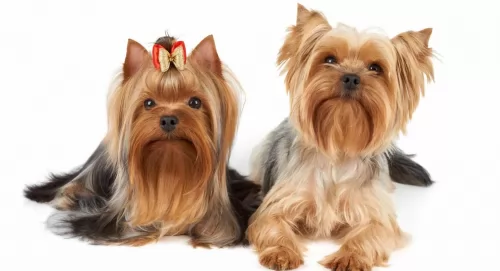 For English bull dog puppies, When you change the puppy food from liquid to solid initially you must give what the dam is having. This is to avoid digestive problems when new food is introduced. The level of liquid food should be reduced in a step by step manner and thus increasing solid food gradually.
For English bull dog puppies, When you change the puppy food from liquid to solid initially you must give what the dam is having. This is to avoid digestive problems when new food is introduced. The level of liquid food should be reduced in a step by step manner and thus increasing solid food gradually.
You have two choices and one is manufactured dog food and another is home cooked food. Commercial brands are not suggested as they contain artificial coloring and chemical preservatives.
Vaccinations should be made at the right time. The food given should be the best.
Yorkshire terrier should be taught tricks by giving rewards. Exercising them has benefits such as maintaining muscles, release pent-up energy, good for heart, good metabolism, good sleep and be active.
 1 Feeding the puppy Puppies should eat a minimum of a cup and max of a cup and three quarters each day. 1-13/4
1 Feeding the puppy Puppies should eat a minimum of a cup and max of a cup and three quarters each day. 1-13/4
2.Feeding the adult Adult Teddy Roosevelt Terriers should eat three-fourth to one-and-a-half cups per day.
3.Points for Good Health - fairly healthy The Teddy Roosevelt Terriers displays some common joint issues that are shared by Rat Terriers.
4. Games and Exercises Having descended from hunting/working dogs Teddy Roosevelt's are able to learn and work conformation rings, and agility trials. They like to play and take part in swims, hikes and playing fetch or Frisbee. They take well to obedience training.